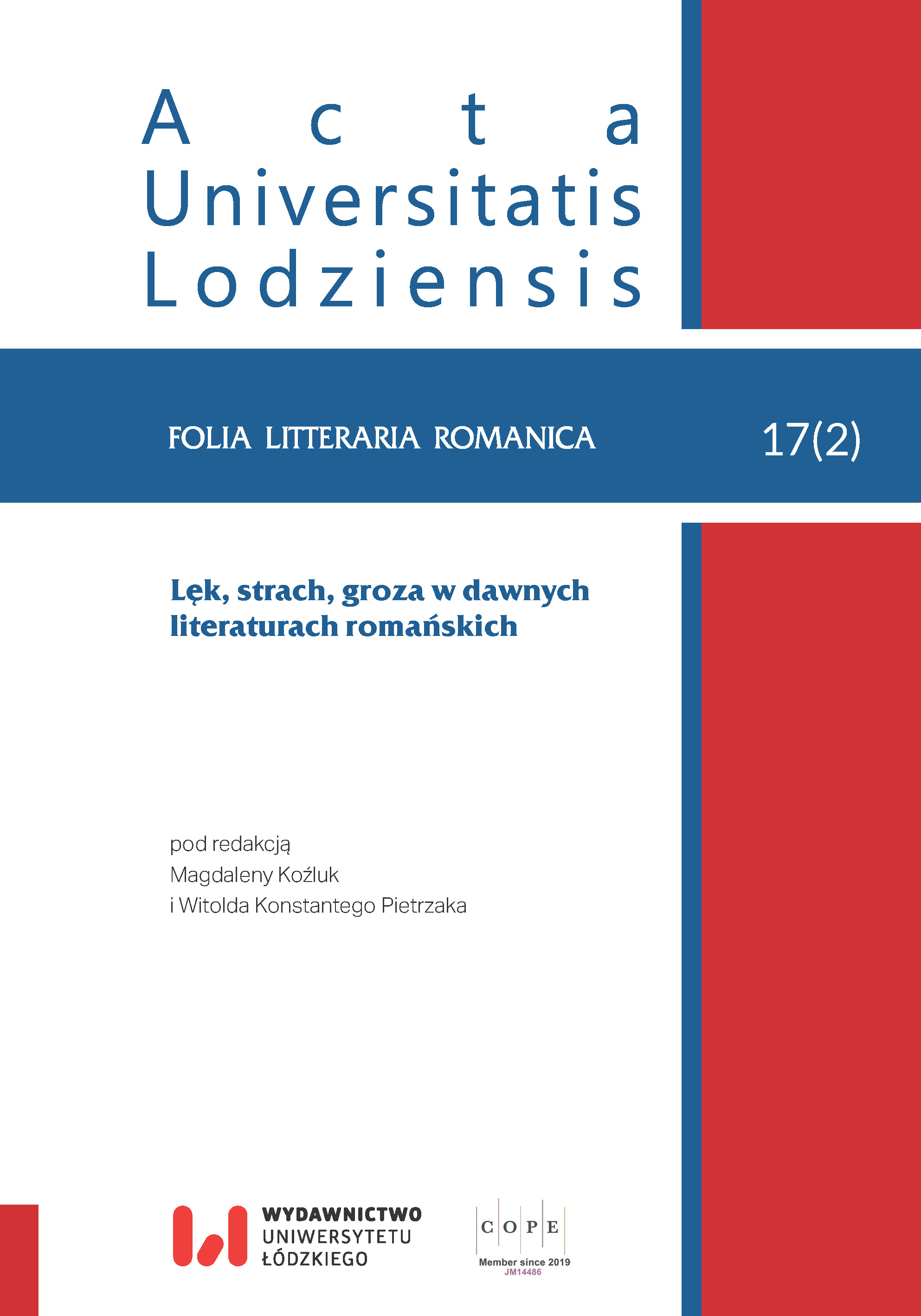Joi as the Origin of Disquiet in Troubadours’ and Trobairitz’ Emotional Communities
DOI:
https://doi.org/10.18778/1505-9065.17.2.03Keywords:
troubadours, emotional communities, courtly love, medieval literature, Occitan literatureAbstract
This paper aims to analyse the courtly love of the troubadours with a particular focus on the relationship between joi and fear or disquiet. With the background of previous concepts, the model of fin’amor as an emotional community with its basic characteristics is presented. On the example of selected texts from the courtly literature, a “map of emotions” of the troubadour world, in which joi plays a central role, is constructed. Joi is defined as “joy acting” or “a state of harmony, ecstasy and inner perfection”. As the etymology of this concept, it is taken as a combination of the words gaudium (joy) and joculum (play). The analysis indicates that the pursuit of joi is both the reason for building the emotional community of fin’amor and the goal of its actors involved. The achievement of joi is based on an elaborate system of literary games. In the emotional community, joi triggers other emotions, including fear and disquiet. Thus, joi is not a state of inner harmony but an ambivalent entity, affecting both the well-being of the individual fin’amor actors and the lack thereof.
Downloads
References
Bec, Pierre, « Trobairitz et chansons de femme. Contribution à la connaissance du lyrisme féminin au Moyen Âge », Cahiers de civilisation médiévale, 1979, no 22, s. 235-262 https://doi.org/10.3406/ccmed.1979.2112
Google Scholar
BEdT (Bibliografia Elettronica dei Trovatori), URL: http://www.bedt.it/BEdT_04_25/index.aspx, data dostępu 15.12.2021
Google Scholar
Boase, Roger, The Origin and Meaning of Courtly Love. A Critical Study of European Scholarship, Manchester, Manchester University Press, 1977
Google Scholar
Brejnak, Sebastian, Niepokój. Nowoczesność w świetle anachronicznych konfiguracji doświadczenia nieswojości, WUJ, Kraków, 2019
Google Scholar
Burzyńska, Anna, „Afekt – podejrzany i pożądany”, in Kultura afektu – afekty w kulturze: humanistyka po zwrocie afektywnym, red. Ryszard Nycz, IBL PAN, Warszawa 2015, s. 115-134
Google Scholar
Camproux, Charles, Joy d’amor (jeu et joie d’amour), Montpellier, Causse&Castelnau, 1965
Google Scholar
Dauksza, Agnieszka, Afektywny modernizm. Nowoczesna literatura polska w interpretacji relacyjnej, IBL PAN, Warszawa 2017
Google Scholar
Dragonetti, Roger, Le gai savoir dans la rhétorique courtoise. Flamenca et Jaufre de Poitiers, Seuil, Paris, 1982
Google Scholar
Duby, Georges, « Le modèle courtois », in Histoire des femmes en Occident. II. Le Moyen Âge, éd. Georges Duby, Michelle Perrot, Christiane Klapisch-Zuber, Paris, Perrin, 2002, s. 323-343
Google Scholar
Dybeł, Katarzyna, „Nic mnie nie cieszy, nic mnie nie smuci prócz Miłowania mego w dali”: poezja trubadurów i truwerów”, in Katarzyna Dybeł, Barbra Marczuk, Jan Prokop, Historia literatury francuskiej, PWN, Warszawa 2005, s. 90-95
Google Scholar
Earnshaw, Doris, The Female Voice in Medieval Romance Lyric, New York, Peter Lang, 1988
Google Scholar
Flamenca, éd. François Zufferey, trad. Valérie Fasseur, Paris, Librairie Générale Française, 2014
Google Scholar
Foucault, Michel, “Sex, Power and the Politics of Identity”, in Michel Foucault, Ethics: Subjectivity and Truth. The Essential Works of Foucault 1954-1984, vol. I, ed. Paul Rabinow, tr. Robert Hurley, New York, The New Press, 1997, s. 163-175
Google Scholar
Frappier, Jean, Amour courtois et Table Ronde, Genève, Droz, 1973
Google Scholar
Freire-Nunes, Irène, Trobairitz et chansons d’ami, Paris, Micro Université, 2012
Google Scholar
Gaunt, Simon, “Poetry of exclusion: A Feminist Reading of Some Troubadour Lyrics”, Modern Language Review, 1990, no 85, s. 310-329, https://doi.org/10.2307/3731812
Google Scholar
Huchet, Jean-Charles, « Les femmes troubadours ou la voix critique », Littérature, 1983, no 51, s. 59-90, https://doi.org/10.3406/litt.1983.2204
Google Scholar
Jeanjean, Henri, “Flamenca: a wake for a dying civilization?”, Parergon, 1998, vol. 16, no 1, s. 19-30, https://doi.org/10.1353/pgn.1998.0125
Google Scholar
Lacan, Jacques, The Ethics of Psychoanalysis, London, Routledge, 1992
Google Scholar
Moore John C., “‘Courtly Love’: A Problem of Terminology”, Journal of the History of Ideas, vol. 40, no 4, 1979, s. 621-632, https://doi.org/10.2307/2709362
Google Scholar
Oliver, Sophie, “Subversive Acts: Female Voice and Performance in the Songs of the trobairitz”, French Studies Bulletin, 2005, no 95, s. 2-7, https://doi.org/10.1093/frebul/kti012
Google Scholar
Rieger, Angelika, Trobairitz: der Beitrag der Frau in der altokzitanischen höfischen Lyrik, Tübingen, Niemeyer, 1991, https://doi.org/10.1515/9783110933413
Google Scholar
Rosenwein, Barbara, Wspólnoty emocjonalne we wczesnym średniowieczu, tł. Grażyna Urban-Godziek, IBL PAN, Warszawa 2016
Google Scholar
Roubaud, Jacques, La fleur inverse. Essai sur l’art formel des troubadours, Paris, Ramsay, 1986
Google Scholar
Roubaud, Jacques, Les Troubadours. Anthologie bilingue, Paris, Seghers, 1971
Google Scholar
Sawczuk-Szadkowski, Michał, „Flamenca i Radość Gry w świecie trubadurów”, Terminus (w publikacji)
Google Scholar
Schnell, Rüdiger, « L’amour courtois en tant que discours courtois sur l’amour », Romania, 1989, t. 110, no 439-440, s. 72-126, 331-363, https://doi.org/10.3406/roma.1989.1622
Google Scholar
Taylor, Robert A., “The Love Ethic: Definition of Fin’amors”, in Bibliographical Guide to the Study of the Troubadours and Old Occitan Literature, Kalamazoo, Medieval Institute Publications, 2013, p. 57-73
Google Scholar
Žižek Slavoj, Metastazy rozkoszy. Sześć esejów o kobietach i przyczynowości, tł. Marek. J. Mosakowski, Wydawnictwo Krytyki Politycznej, Warszawa 2013
Google Scholar
Downloads
Published
Versions
- 2023-08-10 (2)
- 2022-12-30 (1)
How to Cite
Issue
Section
License

This work is licensed under a Creative Commons Attribution-NonCommercial-NoDerivatives 4.0 International License.













